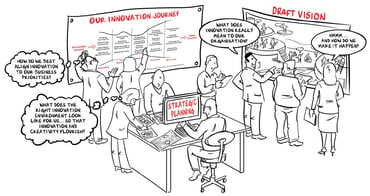You may not have heard about Jordan Belfort before the success of Martin Scorsese’s “The Wolf Of Wall Street”. That movie was based on Belfort’s own memoir about his life as a degenerate stockbroker played by Leonardo di Caprio.
Last month I experienced his motivational speech in Amsterdam about the secret to his success and the insights into his failures that eventually sent him to jail.
Although his morals were not of a high standard back then (as he puts it delicately during his 3.5-hour speech) there is quite a lot that we can learn from him.
So what can The Wolf teach us about becoming better at innovation, ideation and pitching ideas to our stakeholders? I will share my three key lessons with you.
Start with a vision and mirror your innovation heroes
First of all, Jordan explains that you need to have a clear vision of where you will be in 5 to 10 years and what you want to achieve. Make sure your “vision” is different from your “goals”.
“People won’t follow you if you set a goal. People follow you if you have a vision.” – Jordan Belfort
In jail, Jordan was stimulated and motivated by his innmates to write a book about his life. The challenge was that he didn’t know how to write a book as he had never done it before. So he looked at the books he enjoyed reading and learned how to write by copying the style of one of his favorites: “The Bonfire of the Vanities” by Tom Wolfe.
Belfort actually modeled his writing off of Bonfire. He deconstructed its success.
He had the ability to break down what things worked and what things didn't.
Belfort recommends you mirror your (Innovation) Heroes - people like Steve Jobs, and companies like Google – break down their innovation process, see patterns, then model / do them / try them out for yourself.
“You don’t have to know your mentors. I didn’t know Tom Wolfe.” – Jordan Belfort
Control your Inner State
Jordan Belfort advises you to always bring your best to the table whether it’s in sales, meetings, or during brainstorming, when you are not at your best, you will fail (elegantly or sometimes even miserably).
Therefore you need to manage your inner state and try to always operate in a positive winners state: “confidence”, “clarity”, “courage”, and “centainty”.
“Winners use words that say ‘must’ and ‘will’.” Jordan Belfort
Help yourself get out of negative states such as: “fear”, “overwhelmed”, “self-doubt” and “uncertainty”.
“No matter what happened to you in your past, you are not your past, you are the resources and the capabilities you glean from it. And that is the basis for all change.” Jordan Belfort
You can master your inner state with so-called “ancers”. Matthew McConaughey uses an ancer before every scene in all his movies and does chest thumping to put himself in a positive inner state. After five takes of a particular scene, Scorsese was ready to move on, but Leonardo DiCaprio was so impressed by the powerful ancer that he suggested including it in the final cut. Watch the scene of the movie here (in repeat what makes it even funnier).
Think about how you can create a positive inner state when entering a brainstorming session together with your colleagues and stakeholders. How can you motivate yourself and others to excel at your best? What sound, movement and visual could inspire as an ancer to unleash your creativity?
Create an attractive pitch (for your ideas and concepts)
When you have developed these great innovative ideas, you need to create an attractive 2-3 min pitch to sell them to your stakeholders and sponsors.
During the pitch (and especially in the first 4 seconds), Jordan advises us to be Sharp, Enthusiastic, and Expert in our Field. This should create a state where your receiver is focused and ready to listen to the speech. The ultimate goal of the opening is that:
- The receiver must know that you believe 100% in your idea or product concept
- The receiver (or a customer and his problem) must feel addressed
- The receiver must see that you know what you are talking about and that you are sharp
- The receiver must see you as an expert in your field
In the first 4 seconds, it’s hard to “sell your pitch” verbally, so it’s really all about your tone of voice and body language that will either impress or depress your receiver.
Think about the level of your voice. Lean in and speak softly when trying to make a big point. A whisper speaks louder than a scream.
A human has 29 tones of voice, and if you learn how to use them effectively, you are able to persuade anyone, Jordan claims. Leonardo di Caprio studied Jordan Belfort for months to master his style, the movements and levels within his voice to make the perfect pitch.
Remember that the main goal of the pitch is the achievement of the big 3:
- They must love you.
- They must love your idea.
- They must love your team.
If they don’t buy in it’s because one of these items is not true. Make sure that you sell yourself, your idea and your team/company. They must be in love with all three for you to get the buy-in for your idea.
“If you give people a good enough ‘why’, they will always figure out the ‘how’.” Jordan Belfort
I’m actually applying some of the lessons (with success!) myself and they resonate quite a lot with the training I’ve followed earlier this year on Neuro Linguistic Programming - NLP. What about you?
“Successful people are 100% convinced that they are masters of their own destiny, they’re not creatures of circumstance, they create circumstance, if the circumstances around them suck they change them.” Jordan Belfort












